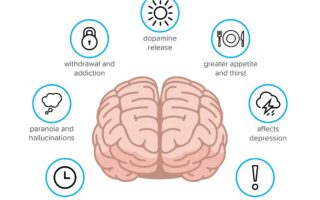Title: The Double-Edged Sword: Unraveling the Truth About Cannabis and Its Potential Harms
Introduction:
In a world where cannabis has transitioned from taboo to mainstream, the conversation surrounding its effects has grown more nuanced than ever. With increasing legalization and a burgeoning market of products touting their therapeutic benefits, it’s easy to overlook the complexities that accompany this versatile plant. As more individuals explore the possibilities of weed—whether for recreation, relief, or both—questions about its potential harms loom large. Can this seemingly innocent herb actually pose risks to our health and well-being? In this article, we embark on a balanced exploration of cannabis, diving into the science, anecdotal evidence, and the myriad factors that contribute to its impact on users. Join us as we navigate the hazy edges of this green frontier, deciphering the truths and myths that shape our understanding of cannabis and its place in society.
Table of Contents
- Understanding the Potential Risks of Cannabis Use
- Psychological Effects: Navigating Anxiety and Mood Changes
- Physical Health Considerations: Is Cannabis a Gateway to Health Issues?
- Practical Recommendations for Responsible Usage and Harm Reduction
- Q&A
- The Way Forward
Understanding the Potential Risks of Cannabis Use
While many people view cannabis as a relaxing and recreational substance, it is essential to be aware of the potential risks associated with its use. One significant concern is its impact on mental health, particularly in individuals predisposed to mental health disorders. Studies suggest that cannabis may exacerbate symptoms of anxiety, depression, and schizophrenia in vulnerable populations, creating a complex interplay between its consumption and mental well-being. Additionally, regular use, especially in high doses, can lead to cannabis use disorder, characterized by dependence and withdrawal symptoms when not using the substance.
Another risk associated with cannabis use is its effect on cognitive functions. Research indicates that cannabis can impair short-term memory, attention span, and decision-making abilities. These cognitive effects are particularly pronounced in younger users, whose brains are still developing. Furthermore, the method of consumption can contribute to adverse effects. For instance, smoking cannabis can lead to lung irritations similar to those caused by tobacco. Here’s a concise summary of potential risks:
| Risk Factor | Description |
|---|---|
| Mental Health Issues | Can exacerbate or trigger disorders like anxiety and depression. |
| Cognitive Impairment | Affects memory, attention, and decision making. |
| Lung Health | Smoking can irritate lungs and airways. |
| Addiction Potential | Risk of developing a cannabis use disorder. |
Psychological Effects: Navigating Anxiety and Mood Changes
The use of cannabis can lead to a complex interplay of psychological responses, ranging from feelings of relaxation to episodes of anxiety. Some users report an enhanced sense of well-being initially; however, this can quickly shift to feelings of unease or paranoia. Factors that may influence these outcomes include:
- Dose: Higher doses are often associated with increased anxiety.
- Strain Type: Cannabis strains high in THC may elevate anxiety levels.
- Personal History: Individuals with a history of anxiety or mood disorders may experience more severe symptoms.
Moreover, understanding how cannabis affects the endocannabinoid system is crucial for navigating these mood fluctuations. Research suggests that while some users may find relief from symptoms like depression and chronic anxiety, others may experience exacerbated symptoms, especially with prolonged use. Here’s a simple comparison of potential psychological effects:
| Effect | Potential Outcome |
|---|---|
| Relaxation | Improved mood and reduced stress |
| Anxiety | Increased feelings of panic or worry |
| Paranoia | Heightened sense of distrust or fear |
| Forgetfulness | Difficulty focusing and retaining information |
Physical Health Considerations: Is Cannabis a Gateway to Health Issues?
The discussion surrounding cannabis often circles back to whether its use can contribute to other health issues. A significant amount of research indicates that while cannabis can provide various therapeutic benefits, it can also pose certain physical health risks, particularly when consumed in excessive amounts or in ways that pressure the body. Key health concerns include:
- Respiratory problems: Smoking cannabis can lead to bronchial irritation and compromise lung function, albeit generally less than tobacco.
- Heart health: Cannabis use may increase heart rate and blood pressure, which can be particularly risky for individuals with pre-existing heart conditions.
- Cognitive effects: Regular use, especially in younger populations, may lead to impairments in attention, memory, and learning.
Additionally, whether cannabis serves as a “gateway” to more harmful substances is a complex question. Many studies suggest that factors such as environment, genetic predisposition, and mental health may play a more critical role than cannabis use itself. To understand this phenomenon better, consider the following:
| Factor | Role in Substance Use |
|---|---|
| Social Environment | Influences exposure to various substances. |
| Genetics | Affects individual susceptibility to addiction. |
| Mental Health | Higher incidence of substance use disorders. |
Practical Recommendations for Responsible Usage and Harm Reduction
Considering the potential risks associated with cannabis use, it’s essential to approach it with a sense of responsibility and awareness. To minimize harm and enhance your experience, consider the following recommendations:
- Know Your Limits: Start with a low dose, especially if you’re new to cannabis. Understanding how it affects you personally can prevent unwanted side effects.
- Choose Quality Over Quantity: Opt for products from reputable sources. Check for lab testing results to avoid contaminants.
- Stay Hydrated: Keep water on hand to combat dry mouth and stay hydrated, as cannabis can often lead to dehydration.
- Avoid Mixing Substances: Combining cannabis with other substances, such as alcohol or certain medications, can intensify effects and lead to adverse reactions.
Moreover, maintaining an environment conducive to a positive experience can make a significant difference. Consider these environmental factors:
| Factor | Impact |
|---|---|
| Setting | A comfortable, safe space enhances relaxation and enjoyment. |
| Company | Surrounding yourself with supportive friends can create a positive atmosphere. |
| Timing | Choose moments when you don’t have responsibilities, allowing for a more enjoyable experience. |
Q&A
Q&A: Can Weed Harm You?
Q: What is marijuana, and why do people use it?
A: Marijuana, or cannabis, is a plant that contains compounds like THC (tetrahydrocannabinol) and CBD (cannabidiol), which interact with our body’s endocannabinoid system. People use it for various reasons, including recreational enjoyment, medicinal purposes, and even for enhancing creativity or social experiences.
Q: Is it true that marijuana can cause addiction?
A: Yes, while many users enjoy cannabis without developing a dependence, research indicates that around 9% of users may become addicted to it. This number rises to about 17% for those who begin using in their teens. Dependency can manifest as cravings, withdrawal symptoms, and difficulty controlling use.
Q: What are the potential short-term effects of using marijuana?
A: Short-term effects can vary widely among users. Commonly reported effects include altered senses, changes in mood, impaired memory, and drowsiness. Some individuals may experience heightened anxiety or paranoia, particularly with high-THC strains.
Q: Can marijuana affect brain development?
A: Yes, studies suggest that heavy or frequent use of marijuana during adolescence can impact brain development. This can lead to issues with cognitive function, memory, and even increased risk for mental health disorders. The younger a person is when they start using, the greater the potential impact on their developing brain.
Q: Are there any long-term health effects associated with marijuana use?
A: Long-term marijuana use can lead to respiratory issues, particularly for those who smoke it. Additionally, heavy use may increase the risk of mental health disorders such as anxiety, depression, and psychosis in predisposed individuals. However, more research is needed to fully understand the long-term consequences.
Q: Can marijuana be harmful if used for medicinal purposes?
A: While many people find relief from various symptoms through medical marijuana, it isn’t without risks. Dosage, strain selection, and individual health conditions play vital roles in its efficacy and safety. Consulting a medical professional is crucial for those considering marijuana for therapeutic uses.
Q: How does marijuana use relate to other substances?
A: Some studies suggest that marijuana can serve as a “gateway” drug, potentially leading users to experiment with other, more dangerous substances. However, this concept is debated. Many factors contribute to substance use, including social environment and individual predisposition.
Q: What about the legal status of marijuana and its impact on usage?
A: The legal status of marijuana varies widely around the world. In regions where it’s legal, emerging regulations aim to minimize harm and educate the public on safe usage. Yet, in places where it remains illegal, users may face legal repercussions, which can prevent open dialogue about its effects and risks.
Q: What should someone keep in mind if they’re considering using marijuana?
A: Individuals should weigh their reasons for using marijuana against the potential risks. Consider factors like personal health history, legal implications, and how it might affect mental and physical well-being. Starting with lower doses and being mindful of the setting can also help users gauge their individual response.
Q: Are there safer ways to consume marijuana?
A: Yes, various consumption methods exist, including edibles, oils, and vaporizing, which may be less harmful than smoking. Each method has its own effects and onset times, so understanding how your body reacts is essential for a safe experience.
Q: What is the takeaway regarding the potential harm of marijuana?
A: Marijuana can have both positive and negative effects. Its impact depends on various factors, including dosage, age of first use, method of consumption, and individual health. Being informed and making thoughtful choices is key to minimizing risks while exploring its potential benefits.
The Way Forward
As we draw the curtain on our exploration of the age-old question, “Can weed harm you?” it becomes clear that the landscape of cannabis is as complex as the plant itself. With its varied effects, potential benefits, and risks, the narrative is anything but black and white. Just as with any substance, the impact of cannabis can hinge on a multitude of factors—individual biology, method of consumption, dosage, and the context in which it is used.
Ultimately, for those curious about cannabis, staying informed and mindful is key. Engaging in open conversations, seeking reputable sources, and understanding one’s own body can pave the way for a more informed perspective. As research continues to evolve, so too will our understanding of cannabis and its nuanced role in health, society, and personal choice. Remember, knowledge is your best ally in navigating the verdant paths of this complex plant. Whether as a tool for relaxation, creativity, or medicinal relief, the choice is yours—armed with insight, responsibility, and a touch of caution.

